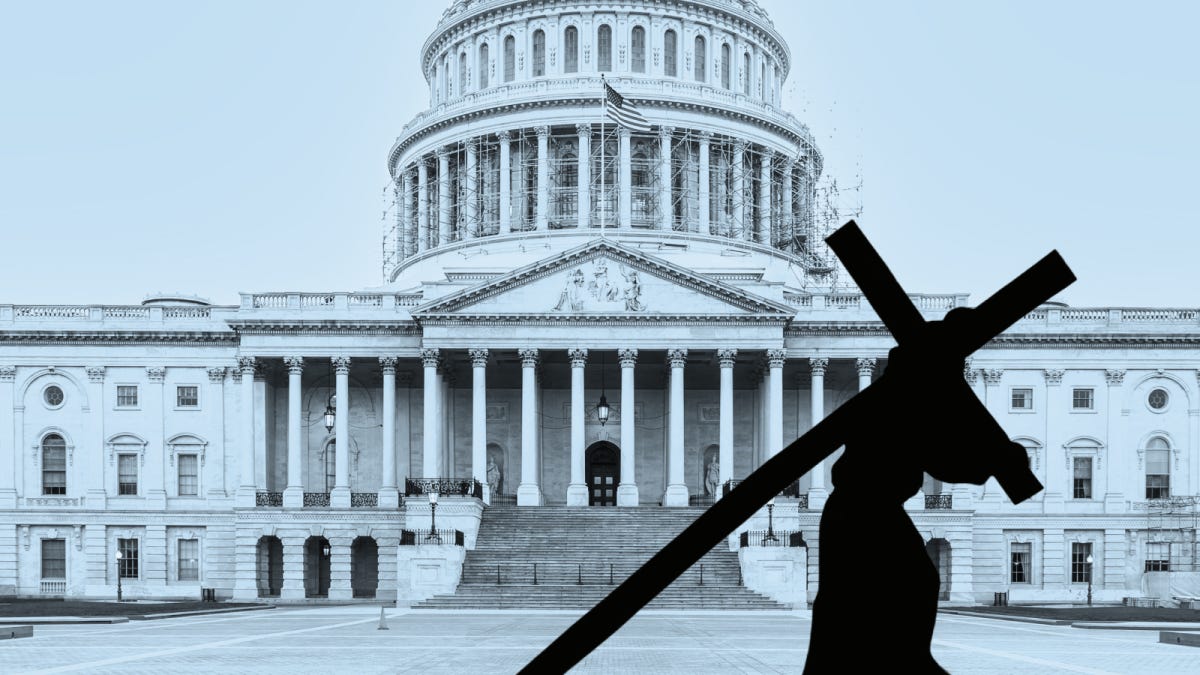Smarter Faster: An atheist's case for a more Christlike Christianity
From “the dumbest thing” he’s ever written to why faith and democracy need each other.
with Stephen Johnson • Thu 5 June, 2025
Hey Big Thinkers,
“Who believes 9/11 was an inside job?” an evangelical pastor asks his parishioners, requesting a show of hands pointed toward the heavens. “Maybe this is what God wanted you to find out — that 9/11 is a fraud and that our country actually has the satanic world government located in New York; it’s called the United Nations.”
A video of that sermon has 787,000 views on X. “It’s definitely my kind of church,” wrote one user. “I’m whatever denomination this is,” wrote another.
But others asked the obvious: What does any of this have to do with Jesus? The answer — nothing — represents a problem in American Protestantism. There’s too much politics from the pulpit on Sunday mornings, even in churches far less extreme.
That’s a key claim in Jonathan Rauch’s latest book, Cross Purposes: Christianity’s Broken Bargain with Democracy. I recently spoke with Rauch, a journalist and atheist, about why he thinks Christianity is in crisis, and why that crisis spells trouble for American democracy.
Read on,
Stephen
THE BIG BARGAIN
The price of Christianity’s “broken bargain” with democracy
Why would an atheist like Rauch care about the state of American Christianity? Two decades ago, he didn’t. He once wrote an essay celebrating the decline of religion in American life, quipping that he was an “apatheist.” Today, he calls that essay “the dumbest thing” he’s ever written. Although still an atheist, Rauch argues that Christianity has been a stabilizing force in American democracy for centuries, one secular America ignores at its own peril. Check out my interview with him featured in our Big Think Books newsletter.
Fast Stats
0 — The anomalies left in the muon’s “magnetic moment” after scientists finally solved the g-2 puzzle in 2025.
3 — The ways to respond to grief based on the philosophies of Kierkegaard, Heidegger, and Camus.
4 — The days we should be working each week, according to economist Juliet Schor’s AI-era proposal.
10 — The quotes about science’s value to society, as highlighted in Ethan Siegel’s recent article.
THE BIG SEARCH
The hunt for alien technosignatures is getting a high-tech upgrade
Thousands of reports. Zero conclusive evidence. That’s the gist of humanity’s investigation into the existence of alien life so far. But scientists aren’t souring on the search. This summer, the search for so-called technosignatures, or signs of alien tech, will get a major boost in the form of the Vera C. Rubin Observatory, which will image the southern sky using the largest digital camera ever built, capable of spotting small objects much farther out in our Solar System than ever before.
MINI PHILOSOPHY
The “SSS” framework: How to change the world with what you have
By Jonny Thomson
When do you call it a day? How much must you do before you say, “Yep, that’s me done”? For most people, the clock defines the finish line. Dong. There goes 5 o’clock — I’m off home, thanks everyone! At other times, the job itself sets limitations. A presentation needs making, an email needs sending, a block needs cleaning, and so on.
But what about those never-ending activities that permeate a life? When it comes to things like “eating well” or “talking with friends,” there are no hard-and-fast rules. “Right, Rosa, it’s been fun, but our 20 minutes are up. See you tomorrow.”
The question I explore in this week’s Mini Philosophy interview with historian Rutger Bregman is: How much is enough when it comes to charity, change, and helping others? Everyone has a limit, but how close does anyone actually get to it?
Learn more in this week’s article below.
Subscribe to Mini Philosophy on Substack for even more from Jonny Thomson.
Popular Columns
Business: The Andrew Mayne interview: How to succeed as a polymath
Starts With A Bang: How fast does planet Earth move through space?Freethink: The AI social network war has begun
THE BIG STORY
5 scientists on finding meaning in our Universe’s 13.8-billion-year story
We could learn nearly everything about the cosmos — the number of galaxies, the nature of dark matter, the secrets of the Universe’s first moments — and be left awestruck yet unmoored. Mind-bending facts don’t necessarily pave a path toward meaning, wisdom, or how to live life. (As philosopher David Hume put it, you can’t derive an “ought” from an “is.”) Still, beyond the cold, hard data, could we find deep meaning in the story of our Universe? That’s the question Shai Tubali explores with five cosmologists and physicists in this wide-ranging essay.
Stephen Johnson is the managing editor at Big Think.
Get more from Big Think:
Mini Philosophy | Starts with a Bang | Big Think Books | Big Think Business














The obvious answer is that religion itself is the fraud. If it was genuine, it would not be cable of being thus misused and misrepresented. It applies from everything from the Crusades to the Spanish Inquisition to the burning of witches to the massacre of the Huguenots to the forcing of Christianity on colonised countries in Africa, America, Asia, Australasia, to the justification of slavery, to the religious conflict in Ireland, to the ISIS Jihads, to the Holocaust, to these modern conspiracy theories. If there actually is a God, which I doubt, then he's laughing up his sleeve at the chaos he has caused.
You’ll never grasp the purpose of Christianity if you start from the top down — from institutions, from politics, from power. You have to start from the soul.
The Church, as we see it today, is a system. But Jesus was not a system builder. He was a soul seeker. And when He said, “Follow Me,” it wasn’t to protect Western liberalism. It was to walk a road that leads through death to life — through mercy, not merit.
Religion, as Rauch partially recognizes, became a structure to manage belief and behavior. But Christianity — true Christianity — begins when you recognize your need for the mercy of the Almighty. It’s not when you adopt certain values. It’s when you say, “Lord, have mercy on me, a sinner.”
From that place — and only from that place — can you see Jesus clearly. His essence is mercy. His example is love. And His invitation is for you to walk with Him, not because it makes you a better citizen, but because without Him, you're lost.
So yes, democracy may benefit from a more Christlike Christianity. But Jesus didn’t come to save democracy. He came to save people.